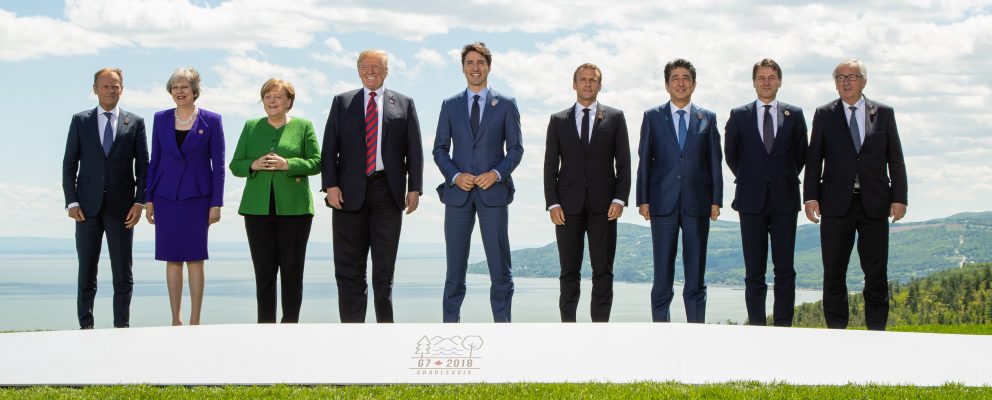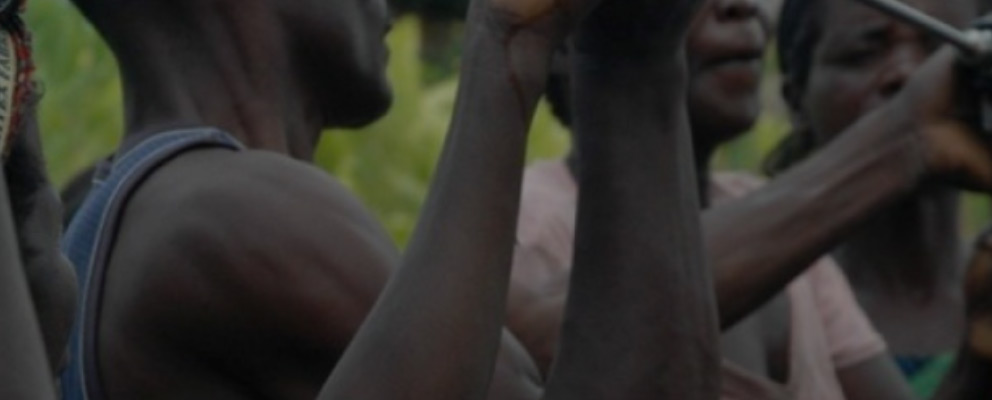
G7 Charlevoix: PM Trudeau rallies support despite U.S. challenges
Over the weekend, 1,500 members of the media representing 300 organizations from around the world descended on Quebec City to report on two days of meetings between more than seven global leaders resulting in one main headline: Donald Trump.
In the days leading up to the G7 Summit, the President of the United States monopolized the news with complaints about unfair trade practices (Canada maintains that the US actually has a trade surplus) and new steel and aluminum tariffs against Canada, Mexico, and Europe.
Foreign Affairs Minister Chrystia Freeland was firm on Canada’s position that the tariffs are “illegal and unjust”, but assured media that conversations with US representatives had been “cordial” and “productive”. Prime Minister Justin Trudeau echoed these comments in his closing press conference, and Trump responded by withdrawing from the summit’s final communique, an unprecedented move condemned by the other G7 leaders and many American policymakers.
In sum:
Angela Merkel’s office has released this photo taken today at the G7, which tells you a lot about how things went. pic.twitter.com/IXX6K3ayys
— David Mack (@davidmackau) June 9, 2018
Trump to our allies. #G7Summit #G7Charlevoix pic.twitter.com/0ldxBvE5kX
— Rachel Dzanashvili (@rachel_dz) June 10, 2018
But these were not the only stories that attracted our attention.
Our Top 5 Takeaways from the G7 Charlevoix
EWB sent two delegates to the G7 – here are our 5 top takeaways:
1.Canada raised $3.8 billion for girls’ education in conflict-affected and fragile states, including $400 million in new ODA from Canada
We were happy to hear Minister of International Development and La Francophonie Marie-Claude Bibeau announce $3.8 billion for girls’ education in conflict-affected and fragile states, the largest contribution to this issue in history. A coalition of civil society organizations including Plan Canada, World Vision, Results Canada, Right to Play, Save the Children and UNICEF Canada helped secure commitments from Japan, Germany, the UK, EU and World Bank. Their efforts managed to triple the original goal of $1.3 billion, with Canada contributing $400 million over three years. This funding will provide a wide range of resources including schools, supplies, and teachers, as well as greater access to education by addressing insecurity, sexual violence, and other risks to girls in crisis situations.
EWB has long been a champion for more and better development assistance, and this targeted funding will go a long way to achieving the Sustainable Development Goals. (See our #Hello2030 campaign to find out how you can help achieve the SDGs!)
Congrats to @CanadaDev & civil society for today’s $3.8b announcement on education for girls in conflict-affected & fragile states, 3x the $1.3b target (w/ $400m over 3yrs from Canada) at #G7Charlevoix! This will have a transformative impact around the world #theFUTUREisFEMINIST pic.twitter.com/0VoLRcHp0n
— Amber Minnings (@AmberMinnings) June 9, 2018
@mclaudebibeau $3.8B ($400M from Canada) over 5 years committed by Japan, UK, EU, Germany, World Bank for girl’s education in crisis-affected developing nations. Largest contribution to education for girls in crisis in history.
— Celia Grimbly (@celiagrimbly) June 9, 2018
2. Canada’s DFI launched the 2X Challenge and aims to attract $3 billion for women-led businesses & economic leadership by 2020
One of the most exciting announcements came from FinDev Canada, our country’s new development finance institute. Thanks to the leadership of Managing Director Paul Lamontagne, all G7 countries signed on to the ambitious 2X Challenge, which aims to raise $3 billion of public and private financing by 2020 to “help advance women as entrepreneurs, as business leaders, as employees and as consumers of products and services that enhance their economic participation.”
During the announcement, Lamontagne acknowledged Canada was the “new kid on the block” having only become operational in January 2018, but this achievement demonstrates the DFI’s ability to lead. Other notable achievements for the institute include a strong gender policy and an advisory council that includes private sector and development experts to ensure that its investments achieve social and economic impacts.
EWB has been a long-time advocate for the establishment of a Canadian DFI, particularly one that invests in high-risk, women-led businesses and in the least developed countries. We’re thrilled to see FinDev move in this direction and convince others to follow. Our CEO Boris Martin is a member of the advisory council, so we’ll continue to be engaged and ensure that each investment contributes to thriving livelihoods for those who have been underserved by historic economic models.
Thrilled to hear @FinDev_Canada announce the #2XChallenge, a collaborative partnership btwn all #G7 devt finance institutions to mobilize $3b of public/private finance by 2020 for women’s financial inclusion, entrepreneurship & leadership! cc @ewb @paullamontagne #G7Charlevoix pic.twitter.com/tKQdlFcjM7
— Amber Minnings (@AmberMinnings) June 9, 2018
Canada’s DFI @FinDev_Canada is “the new kid on the block” but has shown leadership in advancing impact-driven investments, a gender focus & consultation w civil society. Hoping it will also forge the path to high-risk investments in LDCs w greatest need & impact #G7 #2XChallenge
— Amber Minnings (@AmberMinnings) June 9, 2018
3. 5 leaders committed to a much-needed plastics charter to reduce ocean pollution
Canada, France, Germany, Italy and the UK reiterated their commitment to the Paris Agreement on climate change and agreed to a non-binding plastics charter that aims to address and reduce the pollution created by single-use plastic items such as bottles, cups, and bags. As EWB aims to build sustainable and inclusive economies, we welcome this initiative as an important global step toward environmental sustainability.
Catherine McKenna, our Minister of the Environment and Climate Change, also pointed out that Canada only recycles 11% of its plastics and should – and can – do better. Canadians can, therefore, expect a domestic strategy on plastics pollution soon. We’ll be watching the final G7 ministerial meeting on climate change this fall to see if Canada delivers.
Mckenna says Canada needs a domestic policy in addition to potential #G7 agreement on reducing ocean plastic. Canada only recycles 11% of its plastic #WorldOceansDay #G7Charlevoix pic.twitter.com/McAjjp7TM3
— Celia Grimbly (@celiagrimbly) June 8, 2018
We may have more plastics than fish in our oceans by 2050 – we can do better, says Minister of Environment & Climate Change @cathmckenna at #G7Charlevoix. I agree! Let’s say #Hello2030 to a more sustainable world https://t.co/Uyw6gTYoul pic.twitter.com/J43RptCnNI
— Amber Minnings (@AmberMinnings) June 8, 2018
4. Civil society, particularly women’s organizations, had unprecedented input and access – but the G7 is still a very exclusive club
Civil society has been actively engaged in Canada’s G7 process, participating in Ministerial meetings, hosting the Women’s 7 and Civil Society 7 consultations, and through the Gender Equality Advisory Council. The council provided feedback on ministerial documents and produced an ambitious set of 60 recommendations, and civil society organizations were integral in securing the gender-focussed commitments on girls’ education and the DFIs’ funding for women’s economic empowerment.
Beyond these formal, often invite-only processes, however, there were limited opportunities for small, under-resourced organizations and citizens to engage in the process. Peaceful protests, alternative forums, street art and performances outside the summit were seen by many as the only available options to make their voices heard despite a heavy police presence.
Being in the room matters. Only a handful of civil society organizations were able to attend the summit, which means that the G7 remains an opaque, difficult-to-access forum for many and one where many important voices go unheard.
Thank you to our Canadian NGOs who have pushed and challenged us to make this historical announcement.
We make a pretty great team working together towards the single largest investment in education for women and girls in crisis and conflict situations. #G7 #G7Charlevoix pic.twitter.com/S7F99DT1nl
— Marie-Claude Bibeau (@mclaudebibeau) June 9, 2018
Heading into #G7 media centre with @AmberMinnings to get the scoop for @ewb on the efforts of global leaders to build sustainable, inclusive economies #MyG7 #G7Charlevoix pic.twitter.com/2p83v9DBeF
— Celia Grimbly (@celiagrimbly) June 8, 2018
Day 1 at the #G7charlevoix! Happy to be here for int’l discussions on #genderequality #climatechange & growth that works for everyone with @celiagrimbly @ewb #G7 #myG7 pic.twitter.com/nCP4qYwTpP
— Amber Minnings (@AmberMinnings) June 8, 2018
5. Canada set the bar high – now all eyes are on France to see if they’ll reach it
Despite open opposition from some G7 member countries, Canada set a high bar on environmental sustainability, both in terms of commitments made and logistics. For example, over 100,000 trees are to be planted to offset the carbon produced by the summit and recycling, composting, renewably-sourced products, a lack of plastics, and other environmental efforts were noticeable in the media centre.
Canada also set a strong gender-based agenda, including the Gender Equality Advisory Council throughout the planning process and in the summit, and making specific commitments to empower women and girls (though women’s organizations have noted some areas for improvement).
As France prepares to hold the G7 Presidency in 2019, many in civil society and, it seems, the Canadian government and public service are hopeful that it will continue the progressive agenda Canada has set, so as to create continuity, sustainability, and expectations for the US Presidency in 2020.
Did Canada deliver a feminist #G7? @lyricthompson of @ICRW assesses the Charlevoix Summit and finds unprecedented focus on gender equality, but room for improvement: https://t.co/hYcRrCTc6N via @CFR_org
— Women&ForeignPolicy (@CFR_WFP) June 12, 2018
Most of the leaders who attended #G7Charlesvoix agreed to reduce plastic around the world. But will the G7 plan to be effective?@envirodefence‘s Ashley Wallis joined #ctvpp to provide her evaluation#cdnpoli pic.twitter.com/YaC075LSvm
— CTV Power Play (@CTV_PowerPlay) June 11, 2018
Moving the Needle on Issues that Matter
Despite a tense political context, G7 leaders were able to agree on some significant issues – how to restore and protect our oceans from plastics pollution, to invest in girls’ education and women’s entrepreneurship – and devoted billions of dollars in funding to innovative development initiatives.
The G7 Charlevoix concluded with a joint communique from 6 countries that set out their goals both domestically and globally. In other words, now that the G7 summit is over the real policy and implementation work begins.
Unfortunately, EWB’s research shows that G7 countries don’t have a great track record on following through with their commitments, though these can provide a mechanism for civil society to hold governments to account.
G7s are a space for world leaders to speak candidly and build relationships and set norms through non-binding agreements on global issues. The 5 above are our headlines from the G7 summit because they show that when we work hard, together, we can create positive change.
